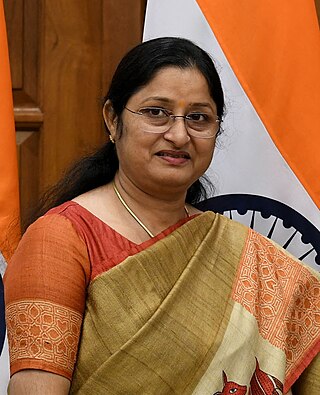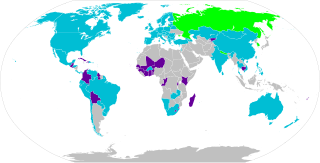Related Research Articles

The legal system of India consists of civil law, common law, customary law, religious law and corporate law within the legal framework inherited from the colonial era and various legislation first introduced by the British are still in effect in modified forms today. Since the drafting of the Indian Constitution, Indian laws also adhere to the United Nations guidelines on human rights law and the environmental law. Personal law is fairly complex, with each religion adhering to its own specific laws. In most states, registering of marriages and divorces is not compulsory. Separate laws govern Hindus including Sikhs, Jains and Buddhist, Muslims, Christians, and followers of other religions. The exception to this rule is in the state of Goa, where a uniform civil code is in place, in which all religions have a common law regarding marriages, divorces, and adoption. On February 7, 2024, the Indian state of Uttarakhand also incorporated a uniform civil code. In the first major reformist judgment for the 2010s, the Supreme Court of India banned the Islamic practice of "Triple Talaq". The landmark Supreme Court of India judgment was welcomed by women's rights activists across India.
International adoption is a type of adoption in which an individual or couple residing in one country becomes the legal and permanent parent(s) of a child who is a national of another country. In general, prospective adoptive parents must meet the legal adoption requirements of their country of residence and those of the country whose nationality the child holds.
In law and conflict of laws, domicile is relevant to an individual's "personal law", which includes the law that governs a person's status and their property. It is independent of a person's nationality. Although a domicile may change from time to time, a person has only one domicile, or residence, at any point in their life, no matter what their circumstances. Domicile is distinct from habitual residence, where there is less focus on future intent.

David Mark Smolin is a professor of law at Cumberland School of Law in Birmingham, Alabama where he is the Harwell G. Davis Chair in Constitutional Law, director for The Center for Children, Law, and Ethics, former director of the Center for Biotechnology, Law, and Ethics, and faculty advisor for the Law, Science and Technology Society.
The China Center of Adoption Affairs (CCAA) was established on June 24, 1996 by China's Ministry of Civil Affairs. The CCAA is responsible for the welfare of children in the care of Child Welfare Institutes (orphanages), domestic adoption, and international adoption.

The Indian Child Welfare Act of 1978 is a United States federal law that governs jurisdiction over the removal of American Indian children from their families in custody, foster care and adoption cases.
Child laundering is a tactic used in illegal or fraudulent international adoptions. It may involve child trafficking and child acquisition through payment, deceit or force. The children may then be held in sham orphanages while formal adoption processes are used to send them to adoptive parents in another country.
There are several notable cultural variations in adoption. Adoption is an arrangement by which an orphaned child or one whose biological parents are unable to care for them is "adopted". While all societies make provision for the rearing of children whose own parents are unavailable to care for them, cultures and legal systems treat an adopted child in different ways ranging from equivalent status to legitimate biological children to guardianship.

The Ministry of Women and Child Development, a branch of the Government of India, is an apex body for formulation and administration of the rules and regulations and laws relating to women and child development in India. The current minister for the Ministry of Women and Child Development is Annpurna Devi having held the portfolio since 2024.
Aboriginal child protection describes services designed specifically for protection of the children of "aboriginal" or indigenous peoples, particularly where they are a minority within a country. This may differ at international, national, legal, cultural, social, professional and program levels from general or mainstream child protection services. Fundamental human rights are a source of many of the differences. Aboriginal child protection may be an integral or a distinct aspect of mainstream services or it may be exercised formally or informally by an aboriginal people itself. There has been controversy about systemic genocide in child protection systems enforced with aboriginal children in post-colonial societies.

The Hague Convention on Protection of Children and Co-operation in Respect of Intercountry Adoption is an international convention dealing with international adoption, child laundering, and child trafficking in an effort to protect those involved from the corruption, abuses, and exploitation which sometimes accompanies international adoption. The convention has been considered crucial because it provides a formal international and intergovernmental recognition of intercountry adoption to ensure that adoptions under the convention will generally be recognized and given effect in other party countries.
The Hindu Adoptions and Maintenance Act (HAMA) was enacted in India in 1956 as part of the Hindu Code Bills. The other legislations enacted during this time include the Hindu Marriage Act (1955), the Hindu Succession Act (1956), and the Hindu Minority and Guardianship Act (1956). All of these acts were put forth under the leadership of Jawaharlal Nehru, and were meant to codify and standardise the prevailing Hindu legal tradition. The Adoptions and Maintenance Act of 1956 dealt specifically with the legal process of adopting children by a Hindu adult, and with the legal obligations of a Hindu to provide "maintenance" to various family members including their wife or parents, and in-laws.
Adoption in Australia deals with the adoption process in the various parts of Australia, whereby a person assumes or acquires the permanent, legal status of parenthood in relation to a child under the age of 18 in place of the child's birth or biological parents. Australia classifies adoptions as local adoptions, and intercountry adoptions. Known child adoptions are a form of local adoptions.
The Family law of Singapore deals with several family legal issues in Singapore. It deals with adoptions, divorce, children's issues, division of matrimonial property, personal protection orders, probate and maintenance. The family court in Singapore oversees these legal issues. Singapore has two separate and different sets of family law: one for Muslims and the other for everyone else. Family law for Muslims is codified in the Administration of Muslim Law Act (AMLA). Family law for non-Muslims is codified in the Women's Charter. The Family Justice Courts of Singapore (FJC) handles all family cases.
The following outline is provided as an overview of and topical guide to adoption:
Adoptive Couple v. Baby Girl, 570 U.S. 637 (2013), was a decision of the Supreme Court of the United States which held that several sections of the Indian Child Welfare Act (ICWA) do not apply to Native American biological fathers who are not custodians of a Native American child. The court held that the procedures required by the ICWA to end parental rights do not apply when the child has never lived with the father. Additionally, the requirement to make extra efforts to preserve the Native American family also does not apply, nor is the preferred placement of the child in another Native American family required when no other party has formally sought to adopt the child.

Adoption in the Philippines is a process of granting social, emotional and legal family and kinship membership to an individual from the Philippines, usually a child. It involves a transfer of parental rights and obligations and provides family membership. The Department of Social Welfare and Development (DSWD) defines adoption as a "socio-legal process of giving a permanent family to a child whose parents have voluntarily or involuntarily given up their parental rights."

The Preventing Sex Trafficking and Strengthening Families Act is a US bill that would address federal adoption incentives and would amend the Social Security Act (SSA) to require the state plan for foster care and adoption assistance to demonstrate that the state agency has developed policies and procedures with respect to the children it is working, and which are (possibly) a victim of sex trafficking or a severe form of trafficking in persons. The bill furthermore requires states to implement the 2008 UIFSA version, which is required so the 2007 Hague Maintenance Convention can be ratified by the US.

Juvenile Justice Act, 2015 has been passed by Parliament of India amidst intense controversy, debate, and protest on many of its provisions by Child Rights fraternity. It replaced the Indian juvenile delinquency law, Juvenile Justice Act, 2000, and allows for juveniles in conflict with Law in the age group of 16–18, involved in Heinous Offences, to be tried as adults. The Act also sought to create a universally accessible adoption law for India, overtaking the Hindu Adoptions and Maintenance Act (1956) and the Guardians and Wards Act (1890), though not replacing them. The Act came into force from 15 January 2016.
Surinamese nationality law is regulated by the 1987 Constitution, the Allocation Agreement of 1975, and the 2014 Surinamese Nationality Law. It is highly influenced by Dutch law. These statutes determine who is, or is eligible to be, a citizen of Suriname. The legal means to acquire nationality, formal membership in a nation, differ from the relationship of rights and obligations between a national and the nation, known as citizenship. Surinamese nationality is typically obtained either under the rules of jus sanguinis, i.e. birth to at least one parent with Surinamese nationality; or on the principle of jus soli, i.e. by birth in Suriname. It can also be granted to a permanent resident who has lived in Suriname for a given period of time or by presidential decree through naturalization.
References
- ↑ "CARA". cara.nic.in.
- ↑ "Central Adoption Resource Authority (CARA)". pib.nic.in.
- ↑ Chandra, Jagriti (21 September 2018). "Live-in partners can adopt now". The Hindu– via www.thehindu.com.
- ↑ "HCCH | #33 - Full text".
- ↑ Venugopal, Vasudha. "New adoption rules: NRIs to be treated on par with Indians". The Economic Times.
- ↑ "Immediate Placement".
- ↑ "Adoption of Indian Children by Foreigners on the Rise". 20 March 2018.
- ↑ "Adoptions in India by Foreign Nationals Grow, Aided by Easier Norms for Special Needs Children". 25 April 2017.
- ↑ "Foreigners can't adopt child without NOC: SC". 15 June 2019.